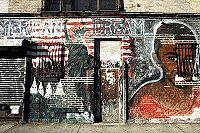Amadou Diallo Mural: Difference between revisions
RachelShuman (talk | contribs) No edit summary |
No edit summary |
||
| (4 intermediate revisions by 2 users not shown) | |||
| Line 3: | Line 3: | ||
====Region: [[:Category:North America|North America]]==== | ====Region: [[:Category:North America|North America]]==== | ||
====Subject: [[:Category:Political/Economic/Social Opinion|Political/Economic/Social Opinion | ====Subject: [[:Category:Political/Economic/Social Opinion|Political/Economic/Social Opinion]]==== | ||
====Medium: [[:Category:Painting|Painting]]==== | ====Medium: [[:Category:Painting|Painting]]==== | ||
---- | ---- | ||
[[File:mural.jpeg|right|200px]] | [[File:mural.jpeg|right|200px]] | ||
'''Artist:''' Hulbert Waldroup | '''Artist:''' [[Hulbert Waldroup, political artist]] | ||
'''Confronting Bodies:''' New York City police officers | '''Confronting Bodies:''' New York City police officers | ||
| Line 16: | Line 16: | ||
'''Location:''' Mural on the corner of Wheeler and Westchester Avenues in the Bronx, New York. | '''Location:''' Mural on the corner of Wheeler and Westchester Avenues in the Bronx, New York. | ||
'''Description of Artwork:''' The mural depicted Amadou Diallo, an immigrant from Guinea, West Africa. On Feb. 4, 1999, | '''Description of Artwork:''' The mural depicted Amadou Diallo, an immigrant from Guinea, West Africa. On Feb. 4, 1999, Diallo was shot forty-one times by four police officers who claimed they thought he had pulled a gun. He died as he stood in the vestibule of his apartment building. The mural also depicted a skeletal Statue of Freedom holding aloft a pistol with a pile of skulls at its feet, four New York City police officers wearing the white hoods of the Ku Klux Klan and the United States flag in flames. | ||
'''The Incident:'''This controversial mural was vandalized when someone had used black paint to erase the images of the officers. The vandal remains unknown. "It’s going to be taken down,” Sgt. Frank Sorensen said after he scanned the mural. Joseph Berrero, the owner of the curio shop where the mural was painted, was upset also and said that he liked the idea of having some kind of memorial for Mr. Diallo, but that he was opposed to Mr. Waldroup’s depiction of the police, the flag and the Statue of Liberty. Except for the portrait of Mr. Diallo, he wanted everything on the mural covered. | '''The Incident:''' This controversial mural was vandalized when someone had used black paint to erase the images of the officers. The vandal remains unknown. "It’s going to be taken down,” Sgt. Frank Sorensen said after he scanned the mural. Joseph Berrero, the owner of the curio shop where the mural was painted, was upset also and said that he liked the idea of having some kind of memorial for Mr. Diallo, but that he was opposed to Mr. Waldroup’s depiction of the police, the flag and the Statue of Liberty. Except for the portrait of Mr. Diallo, he wanted everything on the mural covered. | ||
'''Results of Incident:''' Waldroup restored the work to its original state. He said in response to the mural’s alteration, "I will come back here a hundred times and do it all over again, and each time it will be better than the time before.” The police have expressed their wish for someone would take down the mural, however, due to the publicity and support of the local community, the mural remained unchanged. | '''Results of Incident:''' Waldroup restored the work to its original state. He said in response to the mural’s alteration, "I will come back here a hundred times and do it all over again, and each time it will be better than the time before.” The police have expressed their wish for someone would take down the mural, however, due to the publicity and support of the local community, the mural remained unchanged. | ||
| Line 33: | Line 33: | ||
[[Category:New York City]] | [[Category:New York City]] | ||
[[Category:Political/Economic/Social Opinion]] | [[Category:Political/Economic/Social Opinion]] | ||
[[Category:Painting]] | [[Category:Painting]] | ||
[[Category:Hulbert Waldroup]] | [[Category:Hulbert Waldroup]] | ||
__NOTOC__ | __NOTOC__ | ||
Latest revision as of 21:01, 8 November 2016
Date: 2001
Region: North America
Subject: Political/Economic/Social Opinion
Medium: Painting
Artist: Hulbert Waldroup, political artist
Confronting Bodies: New York City police officers
Dates of Action: April, 2001
Location: Mural on the corner of Wheeler and Westchester Avenues in the Bronx, New York.
Description of Artwork: The mural depicted Amadou Diallo, an immigrant from Guinea, West Africa. On Feb. 4, 1999, Diallo was shot forty-one times by four police officers who claimed they thought he had pulled a gun. He died as he stood in the vestibule of his apartment building. The mural also depicted a skeletal Statue of Freedom holding aloft a pistol with a pile of skulls at its feet, four New York City police officers wearing the white hoods of the Ku Klux Klan and the United States flag in flames.
The Incident: This controversial mural was vandalized when someone had used black paint to erase the images of the officers. The vandal remains unknown. "It’s going to be taken down,” Sgt. Frank Sorensen said after he scanned the mural. Joseph Berrero, the owner of the curio shop where the mural was painted, was upset also and said that he liked the idea of having some kind of memorial for Mr. Diallo, but that he was opposed to Mr. Waldroup’s depiction of the police, the flag and the Statue of Liberty. Except for the portrait of Mr. Diallo, he wanted everything on the mural covered.
Results of Incident: Waldroup restored the work to its original state. He said in response to the mural’s alteration, "I will come back here a hundred times and do it all over again, and each time it will be better than the time before.” The police have expressed their wish for someone would take down the mural, however, due to the publicity and support of the local community, the mural remained unchanged.
Source: The New York Times, Wednesday, April 25, 2001, NCAC
